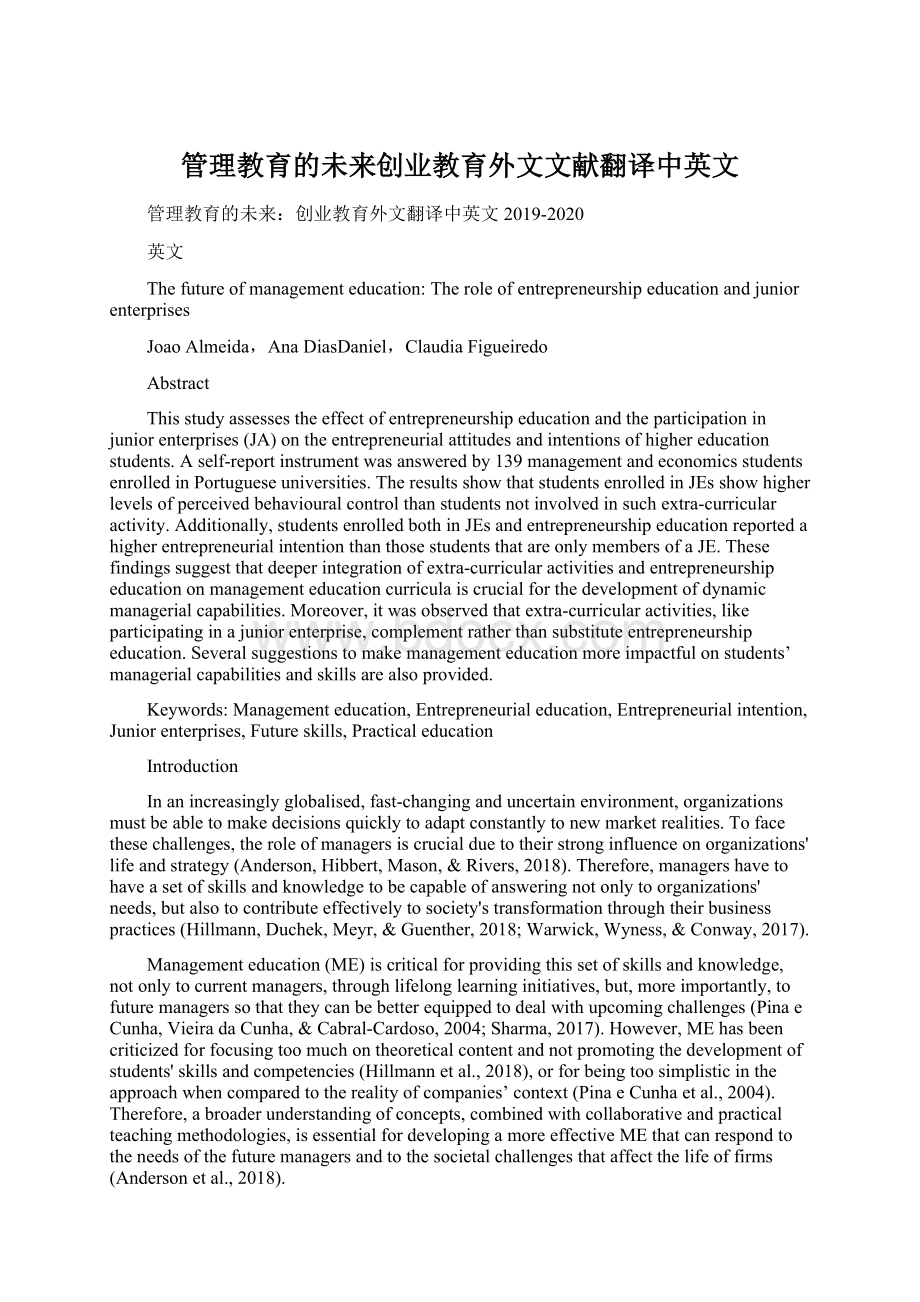管理教育的未来创业教育外文文献翻译中英文.docx
《管理教育的未来创业教育外文文献翻译中英文.docx》由会员分享,可在线阅读,更多相关《管理教育的未来创业教育外文文献翻译中英文.docx(13页珍藏版)》请在冰豆网上搜索。

管理教育的未来创业教育外文文献翻译中英文
管理教育的未来:
创业教育外文翻译中英文2019-2020
英文
Thefutureofmanagementeducation:
Theroleofentrepreneurshipeducationandjuniorenterprises
JoaoAlmeida,AnaDiasDaniel,ClaudiaFigueiredo
Abstract
Thisstudyassessestheeffectofentrepreneurshipeducationandtheparticipationinjuniorenterprises(JA)ontheentrepreneurialattitudesandintentionsofhighereducationstudents.Aself-reportinstrumentwasansweredby139managementandeconomicsstudentsenrolledinPortugueseuniversities.TheresultsshowthatstudentsenrolledinJEsshowhigherlevelsofperceivedbehaviouralcontrolthanstudentsnotinvolvedinsuchextra-curricularactivity.Additionally,studentsenrolledbothinJEsandentrepreneurshipeducationreportedahigherentrepreneurialintentionthanthosestudentsthatareonlymembersofaJE.Thesefindingssuggestthatdeeperintegrationofextra-curricularactivitiesandentrepreneurshipeducationonmanagementeducationcurriculaiscrucialforthedevelopmentofdynamicmanagerialcapabilities.Moreover,itwasobservedthatextra-curricularactivities,likeparticipatinginajuniorenterprise,complementratherthansubstituteentrepreneurshipeducation.Severalsuggestionstomakemanagementeducationmoreimpactfulonstudents’managerialcapabilitiesandskillsarealsoprovided.
Keywords:
Managementeducation,Entrepreneurialeducation,Entrepreneurialintention,Juniorenterprises,Futureskills,Practicaleducation
Introduction
Inanincreasinglyglobalised,fast-changinganduncertainenvironment,organizationsmustbeabletomakedecisionsquicklytoadaptconstantlytonewmarketrealities.Tofacethesechallenges,theroleofmanagersiscrucialduetotheirstronginfluenceonorganizations'lifeandstrategy(Anderson,Hibbert,Mason,&Rivers,2018).Therefore,managershavetohaveasetofskillsandknowledgetobecapableofansweringnotonlytoorganizations'needs,butalsotocontributeeffectivelytosociety'stransformationthroughtheirbusinesspractices(Hillmann,Duchek,Meyr,&Guenther,2018; Warwick,Wyness,&Conway,2017).
Managementeducation(ME)iscriticalforprovidingthissetofskillsandknowledge,notonlytocurrentmanagers,throughlifelonglearninginitiatives,but,moreimportantly,tofuturemanagerssothattheycanbebetterequippedtodealwithupcomingchallenges(PinaeCunha,VieiradaCunha,&Cabral-Cardoso,2004; Sharma,2017).However,MEhasbeencriticizedforfocusingtoomuchontheoreticalcontentandnotpromotingthedevelopmentofstudents'skillsandcompetencies(Hillmannetal.,2018),orforbeingtoosimplisticintheapproachwhencomparedtotherealityofcompanies’context(PinaeCunhaetal.,2004).Therefore,abroaderunderstandingofconcepts,combinedwithcollaborativeandpracticalteachingmethodologies,isessentialfordevelopingamoreeffectiveMEthatcanrespondtotheneedsofthefuturemanagersandtothesocietalchallengesthataffectthelifeoffirms(Andersonetal.,2018).
Someoftheskillsneededbyfuturemanagersincludealertness,opportunityrecognition,creativeproblemsolving,pro-activityandresilience(Gebauer,2013; Hillmannetal.,2018)whichareskillsassociatedtoentrepreneurialbehaviour,suggestingthatacloserintegrationbetweenthedevelopmentofentrepreneurialskillsandMEmaycontributeforimprovingMElearningoutcomes.
Theimportanceofentrepreneurshipeducation(EE)hasbeenrecognizedbybothresearchers(Gibb,1987; Kuratko,2005; Pittaway,Hannon,Gibb,&Thompson,2009; Vazquez,Lanero,Gutierrez,&Garcia,2011)andpolicymakers(EuropeanCommission,2012, 2006; Wilson,2008).Despitetheextensiveresearchonthistopic,therearestilldoubtsregardingwhichapproaches,contents,andmethodsaremoreeffectivefordevelopingstudents’entrepreneurialskillsandbehaviours(Blenker,Korsgaard,&Neergaard,2011; Egerová,Eger,&Mičík,2018; Fayolle,2005).ManyauthorssuggesttheuseofnewteachingmethodologiesinEEcourses(Daniel,2016; EuropeanCommission,2008),beingthelearning-by-doingorexperience-basedlearningtwoofthemorerelevantmethodologiesexplored(González,Castro,González,&Cendón,2016; Thompson,Scott,&Gibson,2010).Extra-curricularactivities,suchasjuniorenterprises(JEs),canprovidetheadequatecontextforimplementingthesemethodologies(EuropeanCommission,2012; Pittaway,Rodriguez-Falcon,&King,2011; Thompsonetal.,2010).JEsarenon-profitorganizations,whichareimplementedandmanagedexclusivelybyhighereducationstudentsandthataimatprovidingservicestoexternalstakeholders.Bydoingso,thoseorganizationsupportlearning-by-doingexperienceswhichenabletheconsolidationoftheoreticalknowledge,fosteringanentrepreneurialspiritandenhancingtheemployabilityoftheirmembers(JADE,2017).
Ourcontributiontothisdebateistoprovideshredsofevidenceregardingtheroleofformalandinformalentrepreneuriallearninginitiatives,suchasentrepreneurshipeducationandtheparticipationinJEs,inthedevelopmentofanentrepreneurialbehaviouramongMEstudents,throughassessingstudents’entrepreneurialintention(EI)anditsantecedents.ManystudiesshowthatEI,anditsconsequententrepreneurialbehaviour,canbeenhancedthroughtheexposuretoEEorinacontextwherestudentsexperienceentrepreneurialactivities,suchasinthecaseofJEs(Morris,Webb,Fu,&Singhal,2013; Schelfhout,Bruggeman,&Maeyer,2016).Therefore,itisrelevanttounderstandhowEEcoursesandparticipationinextra-curricularactivities,suchasJEs,canimproveentrepreneurialskillsandbehaviour(Binks,Starkey,&Mahon,2006).
ThemainobjectiveofthispaperistocontributetothedesignoffutureMEprogramsthatbetterequipstudentswiththeskillsneededtodealwithfuturebusinesschallenges,throughunderstandingtherelevanceofentrepreneurialteachinginitiativesforthedevelopmentofMEstudents’entrepreneurialintentionandbehaviour.Thus,thispaperaimstoanswerthefollowingresearchquestion:
Istheparticipationinentrepreneurshiptrainingcoursesand/orinJEsimportantforthedevelopmentofentrepreneurialbehaviourofmanagementstudents?
Thefutureofskills:
thecaseoffuturemanagers
Challengesrelatedwiththeincreasingglobalisation,demographicandtechnologicalchanges,aswellaspoliticalandeconomicuncertainty,andenvironmentalsustainabilityaresurelyshapingthefutureofoursociety(Bakhshi,Downing,Osborne,&Schneider,2017).Toovercomethosechallengesitwillbenecessary,ontheonehand,aconstantadaptationandresilienceofcitizens,whichreflectstheneedfordevelopingnewskillsandknowledge,especiallyamongyoungpeoplethatsoonwillenterthelabourmarket(Volkmannetal.,2009).Infact,asmentionedinthereport TheFutureofSkills:
Employmentin2030,futurelabourforceshouldbeequippedwithasetofnewskills,suchasinnovativeproblem-solvingpractices,aswellasthecapacitytocreatenewalternatives,andtodetectchangesornewopportunitiesintheenvironment(Bakhshietal.,2017).Also,competencieslikelong-termvisioning,criticalthinking,andinterpersonalskillsareconsideredcrucialrequirementstofuturejobperformance(Hillmannetal.,2018; Schumacher&Mayer,2018).Ontheotherhand,organizationsneedtobecomeincreasinglyflexibletoanticipate,adaptto,and/orrapidlyrecoveringfromnegativeeventsthatmayoccur(Lengnick-Hall,Beck,&Lengnick-Hall,2011),aswellastotakeadvantageofmarketopportunitiesthatmayarise.Inthiscase,managerswillhaveagreaterresponsibilityduetotheirstronginfluenceonorganizations'strategy(Andersonetal.,2018).Managersarekeyactorsinpromotingtheorganization'sstrategicorientation(Adner&Helfat,2003; Carmeli,Friedman,&Tishler,2013),resilience(Gebauer,2013; Hillmannetal.,2018; Shin,Taylor,&Seo,2012)andinnovation(Kearney,Harrington,&Kelliher,2018),sincetheypossesstosomeextentdynamicmanagerialcapabilitieswhichenablethemtocreateormodifythefirm'sresourcebaseandcompetencies(Helfat&Martin,2015).Severalstudieshaverelatedmanagers'dynamicmanagerialcapabilitieswiththeabilityoffirmstoadaptandstriveunderconditionsofchange(e.g. Boyd,Haynes,Hitt,&Ketchen,2012; Peteraf&Reed,2007).Astudyconductedby Buil-Fabregà,Alonso-Almeida,andBagur-Femenías(2017) showthatmanagers'individualdynamiccapabilitieshelpthemtodetectchangesinthemarketearlierandtopromotebusinesssustainability.Thus,firmswithstrongdynamiccapabilitiesareintenselyentrepreneurial,whichmeansthat“theynotonlyadapttobusinessecosystems,butalsoshapethemthroughinnovationandthroughcollaborationwithotherenterprises,entities,andinstitutions”(Teece,2007,p.1319).
Accordingto AdnerandHelfat(2003),dynamicmanagerialcapabilitiesarerootedinthreeunderlyingfactors:
managerialcognition,managerialsocialcapital,andmanagerialhumancapital.Thefirstfactor,managerialcognition,isrelatedtomanagerialbeliefsandmentalmodelsthatserveasabasisfordecisionmaking(Walsh,1995).Inturn,managerialsocialcapitalresultsfromsocialrelationshipsandcanconferinfluence,control,andpower(Adler&Kwon,2002).Finally,managerialhumancapitalreferstoskillsacquiredthrougheducationandtraining,aswellaspriorworkexperience(Khanna,Jones,&Boivie,2014).Thesefactorsmayactcombinedorseparatelytoinfluencethestrategicandoperationaldecisionsofmanagers.Forinstance,education,training,andworkexperienceaffectalsomanagerialcognition(Corrêa,Bueno,Kato,&Silva,2018),andmanagerialsocialcapital.Thus,managementeducation(ME)playsacentralroleinequippin